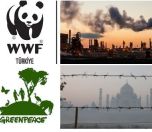Click to read the article in Turkish
Today is World Environment Day.
June 5 has been observed as the environment day since a United Nations conference in 1974 in Stockholm.
This year's theme is biodiversity, with the slogan of "the Time of Nature," which focuses on demanding action to combat the accelerating loss of species and degradation of nature.
The Wheat Association, WWF Turkey, Greenpeace and the Turkish Foundation for Combating Soil Erosion (TEMA) elaborated on what to do in a time when 25 percent of all species on the Earth, or about one million species, are facing extinction.
Wheat Association: We change biodiversity with our actions
Saying that the coronavirus pandemic has shown that our planet is not a "resource" that will be at our disposal forever and that we are a part of a whole as all living and inanimate beings.
Destroying biodiversity could destroy us, it said: "With our actions, we disrupt both the structure and functions of ecosystems and change local biodiversity. As a result of our activities in all areas of life such as energy, agriculture, transportation, the wounds we open in natural life come back and affect us. We reap whatever we sow on our little planet, where none of us is independent of one another.
"One of the things Covid-19 has made us realize is how important preventive health, that is, our body resistance, is to be protected against diseases.
"Studies on the effects of climate change, deforestation, disappearing vegetative and animal diversity, soil contaminated with chemicals and water, food poisoned with pesticides and increasingly disappearing food diversity, show that our immune system is not detached from the whole.
"We didn't know that the virus would come, but we do know the destruction that will be caused by water and soil pollution, deforestation, damage to biodiversity, wars, and climate changes.
"Therefore, we must develop responsible policies and strategies for future generations regarding all our needs, from energy to agriculture, from health to education, from housing to transportation."
WWF Turkey: A new beginning
"The decisions to be made after the challenging Covid-19 process, which is still threatening our health, and economic and social effects of which continue, will then determine 'what kind of world we will live in.' Before the crises such as climate change, losses of natural areas, and extinction of species become deeper and exceed a threshold that we cannot go back, we need to make a new beginning for nature and humans.
"Continuing the effort in combating the pandemic with determination and solidarity to prevent the climate crisis and biodiversity loss will make us more resistant to future challenges. The assurance of human health and well-being is a healthy nature and healthy wildlife. "
Greenpeace: A wound that cannot be relieved in two months
Indicating the five environmental problems in the first five months of 2020 —plastic pollution, the food crisis, air pollution, coal-fired plants and the water crisis— Greenpeace said the problems could not be solved with being confined at home for two months.
"During the period when the whole world was confined at home, we have often read stories such as 'Dolphins crossed the Bosphorus,' 'The air has been cleaned'. However, the essence of the matter was not like that. The destruction caused by humanity to nature is so deep a wound that cannot be dressed with the whole world confining at home for two months."
TEMA: We are in the Anthropocene age
The TEMA stated that continuing our lives in a healthy way depends directly on biological diversity, adding that humanity feels the need to redefine its relationship with nature. But it should take action without losing time as habitats are being damaged and 32 million hectares of forest were destroyed between 2010 and 2015 alone, it said.
"On the other hand, the widespread use of pesticides and chemical fertilizers destroys soil biodiversity and bees, whose role in pollination is indisputable, and pollutes aquatic ecosystems.
"Because we changed our planet with climate change, pollution, urbanization and wild mining, the extinction rates of species in our era, which is called the Anthropocene age, are a thousand times more than the loss of species in the history of humanity.
"We hope that more concrete steps will be taken in the post-pandemic world to fight the climate crisis, which threatens nature and biodiversity. "
What does the Earth tell us?
In its Living Planet Report 2020, WWF says, "We are pushing our planet to the brink. Human activity—how we feed, fuel, and finance our lives—is taking an unprecedented toll on wildlife, wild places, and the natural resources we need to survive."
"On average, we've seen an astonishing 60% decline in the size of populations of mammals, birds, fish, reptiles, and amphibians in just over 40 years, according to WWF's Living Planet Report 2018. The top threats to species identified in the report link directly to human activities, including habitat loss and degradation and the excessive use of wildlife such as overfishing and overhunting.
"The report presents a sobering picture of the impact human activity has on the world's wildlife, forests, oceans, rivers, and climate. We're facing a rapidly closing window for action and the urgent need for everyone to collectively rethink and redefine how we value, protect, and restore nature." (TP/VK)





